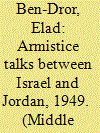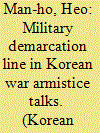|
|
|
Sort Order |
|
|
|
Items / Page
|
|
|
|
|
|
|
| Srl | Item |
| 1 |
ID:
115329


|
|
|
|
|
| Publication |
2012.
|
| Summary/Abstract |
The article examines the armistice talks between Israel and Jordan (March-April 1949) from the perspective of the UN mediator, Ralph Bunche, who coordinated them. The period described was stormy and complex: at its start, Israel took control of the southern Negev. Later, the two countries conducted formal talks in Rhodes, under Bunche's watchful eye, in parallel to informal negotiations, without UN involvement, in Jordan. The article, based to a large extent on Bunche's unpublished diary, explains why Bunche, who maintained rigorous control of all of the other armistice talks, behaved differently in this case, giving his post factum seal of approval to the Israeli takeover of the southern Negev and allowing Israel to pressure Abdullah to hand over the Triangle. The thesis is that Bunche, who could have put an end to the talks by resigning, or drawn the US into the crisis (as he did in the other rounds of negotiations), recognized the complexity of the relations between Israel and Abdullah and chose to act in a way that would prevent a new eruption of hostilities. In effect he was protecting Abdullah, who would have been likely to lose the West Bank to Israel in another round of fighting.
|
|
|
|
|
|
|
|
|
|
|
|
|
|
|
|
| 2 |
ID:
128016


|
|
|
|
|
| Publication |
2014.
|
| Summary/Abstract |
For the Korean War Armistice Talks, as in any war, the establishment of the military
demarcation line was one of the major points of contention between the UN and
Communist forces. Furthermore, the lack of a maritime demarcation line was a
distinct marker in the case of the Korean War. As most international negotiations
do not include detailed information beyond the official transcripts, external indicators
and indirect measures must be considered for a more complete analysis. While
this inferred approach cannot replace a direct systematic study of the negotiation
process, it can still produce some enlightening explanations.
In particular, based on negotiation theory, the current research will focus on the
causes and processes that led to the rejection of the UN forces' request to shift the
land demarcation line further north in return for lifting their naval blockade of the
North Korean sea areas, and the settlement of the maritime demarcation line as it
is today. Thus, the processes, agenda setting, and conclusions of the negotiations
are examined, along with the policy of the United States for ending the Korean
War.
|
|
|
|
|
|
|
|
|
|
|
|
|
|
|
|
|
|
|
|
|